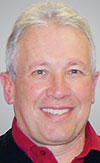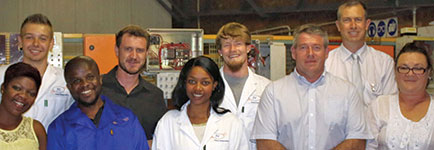
SAFPA’s training initiative to develop properly accredited fluid power qualifications for the industry has made significant progress. Motion Control’s editor recently paid a visit to the training service provider, JFa2 FET College in Boksburg, to meet the new learners and find out more about this groundbreaking project.

In 2015 SAFPA, recognising that there were no formal fluid power qualifications in existence, held a workshop to gauge industry’s interest and commitment to rectifying this situation. With the overwhelming support of the industry, SAFPA’s Hugo van Niekerk and Wessie van der Westhuizen commenced the search for a suitable service provider. JFa2 FET College in Boksburg rose to the challenge. Merseta accreditation for Level 2 – mechanical engineering with a specialisation in fluid power – was achieved in record time in May 2016, all the theoretical and practical components were put into place and on 1 September 2016 the first batch of six learners commenced training. By the end of May 2017 they will have completed the theoretical portion of the qualification and all will have workplace placement for six months for the practical side.

“This is Level 2, First Phase, and is where the first round of learning is taking place,” says van Niekerk. “Workplace placement is the flame test as to whether the learners are meeting expectations, and we are looking forward to the feedback. When completed we will evaluate, iron out the niggles and make sure everything is running smoothly.”
The next intake for learners at Level 2 will be in May 2017. “Our main focus is to keep the pipeline going,” he continues. “We are now working on Level 3 accreditation. However, we still need equipment for this level. BMG has made a very large donation of equipment for which we are very grateful. We have also had donations of hoses, fittings and couplings, pumps and gears.” As part of Level 3, a hydraulic crimping machine is required and SAFPA is funding this to the tune of R61 652. The college is currently taking in the donated stock and once this is done SAFPA will consolidate and get feedback about the equipment shortfall and send out another request to industry for more hardware. Once the hardware is in place, Merseta will hand over the training material for Level 3 and SAFPA will review the content and give feedback about what to change. Then JFa2 will apply for accreditation. This is expected in May or June and the intake for NQF3 will probably be next January.
The project is currently being funded by JFa2. “This has been a huge strategic investment for us and we have had to make a really strong buy-in,” says financial manager, Anneke Canei. “We established student funding for the first intake and are hoping to apply for further learnerships through Merseta. We are very thankful that things are happening, I don’t feel so alone anymore.”
Van der Westhuizen says that a lot of effort has been directed at making clear to industry how to apply for grants and funds. Once a learner gets recruited for training, he or she can apply for a learnership with the training institution. Canei adds that JFa2 has secured the services of an assessor from 1st April and will also have access to a facilitator/moderator for some of the unit standards to make sure that the curriculum quality control complies. The fluid power industry will also assist with assessors.
Opportunities for RPL
JFa2 academic manager, Joel Phiri explains that many employees have been working in the fluid power industry for a long time and one of the objectives is to put RPL processes in place for them. ”In the near future one of the spin-offs is that a lot of people will come to be assessed for the RPL process only and we will be able to produce a large number of qualified people in a short space of time and ramp up the number of qualified personnel at Level 4. This is a very large benefit,” he continues. “We have looked at in-between experience and expertise and whether it is up to the standard. We believe we have a solid base for the RPL process going forward,” adds van Niekerk.
Van der Westhuizen explains that the RPL process involves:
1. Assessing the applicant to be competent to the Level 2 standard.
2. If not already competent, identifying the training shortfall and selecting training elements and putting necessary training into place to address shortfalls.
3. Declaring applicants competent on the Level 2 standard.
This will lead to a stream of learners qualified for NQF3. However he adds that the issue of mentors is a big challenge going forward.
What’s in it for industry?
There are thousands of companies registered in the fluid power industry but there are almost no trade qualifications. Van Niekerk says that SAFPA is developing a base skill level of resources for industry to tap into. “Companies will be able to claim on their skills development levy,” adds van der Westhuizen. “There are also tax incentives, and tax rebates can be claimed through SARS. The training cost can be claimed back under the skills development levy for pivotal programmes. As far as equipment goes, JFa2 is an NPC and can supply a receipt so that companies can get a tax write-off for any equipment donated.”
“Industry has seen the value of having this qualification. However, we need to be cautious about how we will manage the expectations of industry, they must expect a basic level,” cautions Phiri. “The value to industry is when you get to specialise at Level 5 at the National Certificate level. Levels 2 to 4 are the basic qualifications.”
What’s required from industry?
SAFPA need industry to engage with JFa2 to register individuals on learnerships and donate any spare equipment available. Ten out of the twelve learnerships have already been created. SAFPA is now drafting a communication that will be sent out to industry explaining the process and highlighting the way forward. JFa2 will be the training provider. SAFPA wants to emphasise that the qualification applies to the whole fluid power industry not just hydraulics. So Pirtek, for example, will act as a lead employer and register the learner for the full qualification. There will then be a host employer for the pneumatics discipline, Festo for example. So everyone shares the load in order to get the kids through the experiential side.
Outstanding commitment
Van Niekerk says that the commitment that JFa2 has showed to the qualification has been outstanding. “We went through more than 20 institutions. The next target is Level 4 and we will have to prepare for the accreditation and receive content.”
“We are very excited about this new course. It is a complete new field for the learners and JFa2 wants to be the institute of training for fluid power,” says Canei enthusiastically. “Ultimately we will have the first trained and qualified fluid power learners in the country,” concludes van der Westhuizen.
| Tel: | +27 11 061 5000 |
| Fax: | 086 589 2158 |
| Email: | [email protected] |
| www: | www.safpa.org.za |
| Articles: | More information and articles about SA Fluid Power Association (SAFPA) |

© Technews Publishing (Pty) Ltd | All Rights Reserved